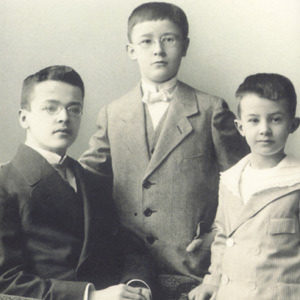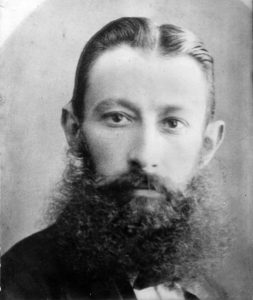Castle of Trenčín on top of a steep rock in Slovakia.
Author: C .T.
‘A new epoch is coming, one perhaps even more revolutionary than that resulting from Copernicus’s work’. —SS pamphlet
One of the advantages of not having our books published by a well-known publisher is that you can polish the content of all of them until they are just right.
Now that I’ve uploaded the PDFs to the featured post I realised that I could make some improvements, such as cutting and pasting those texts from the Daybreak book that I didn’t write into On Exterminationism, so that the former would have only my articles (also, Mauricio’s ‘How awake are you’ looks better in On Exterminationism than in Daybreak).
 It is very difficult to arrange a series of books in such a way that the dialogue between them is impeccable. When I took a hard sciences course at the Open University of Manchester, I was impressed that eleven textbooks published by the OU (pic, the 9th) alluded to one another, with the proper numbering so that the student may review some passage from another book. Editorially, doing this through eleven books is very difficult unless there is a supervisory team to order, in the most didactic way possible, the content of the entire course.
It is very difficult to arrange a series of books in such a way that the dialogue between them is impeccable. When I took a hard sciences course at the Open University of Manchester, I was impressed that eleven textbooks published by the OU (pic, the 9th) alluded to one another, with the proper numbering so that the student may review some passage from another book. Editorially, doing this through eleven books is very difficult unless there is a supervisory team to order, in the most didactic way possible, the content of the entire course.
But a single person can manage to order his thoughts on paper if he has unlimited time, which is what happens when no reputable publisher dares to publish any of our books (or censors them as Lulu, Inc. did).
Also, on Wednesday I posted a comment reminding visitors of the existence of an article in which I quoted the passage from Desmond Morris that so impressed me about why female breasts are so beautiful. Of course, I had alluded to that passage in the opening essay of On Beth’s Cute Tits but I hadn’t quoted it to speed up the little essay. But now that I’ve been going through my Daybreak Publishing books, it occurred to me to add that late-2020 entry to the book (or rather a mere PDF, while I get the funds for a printer).
* * *
What is killing the white race is neochristianity, in the sense of taking the Christian idea that only human souls are real—not the body or race—to its ultimate consequences. Watch Matt Walsh’s film ‘What is a Woman?’ on YouTube!
Paradoxically, the Woke monster that has Christians like Walsh scared is nothing more than taking the Christian principle of the human soul to the secular plane; for example, that there are men with vaginas, women with penises, and men who menstruate or who can give birth because what matters is how a particular human self-perceives himself or herself: a soul. It doesn’t matter that many atheists and agnostics no longer believe in post-mortem survival. What matters is that the Christian principle of the human soul has mutated into the secular realm in the most bestial way imaginable.
One of the things I liked most about Desmond Morris’s The Naked Ape is that it confronts us with the fact that we are just another animal species: something that even secular humanists fail to understand. Their neochristian programming still carries atavisms, the dragon’s tail as it were, of the old religion of our parents. Himmler, or whoever wrote the SS pamphlet we reproduced in The Fair Race, hit the nail on the head when he said that the revolution of understanding this sort of thing could be far more cataclysmic than the Copernican revolution. Hence the relevance, I would add, of approaching the human being from the point of view of zoology, as Morris does.
When I finish making these changes, I will add an entry containing the revised PDFs and delete the PDFs I’ve linked to in the featured post. So, in time, these books will remain as didactic as the science course I took at the OU the previous century: a time when you didn’t see so many people of colour in Manchester.
Painting of the day
True Himmler, 3
Editor’s Note: Below, excerpts from the third chapter, ‘A Witch in the Family’, of David Irving’s book on Heinrich Himmler (available through Irving’s bookstore here).
______ 卐 ______
Himmler’s missing 1940 diary appeared on the auction block in Munich in 2006; we were languishing that year in a Vienna prison cell, convicted of ‘reviving the Nazi Party’ through views expressed sixteen years earlier. The original is now deposited under glass, like a rare poisonous beetle, in the museum of a medieval castle called Wewelsburg, of which we shall eventually hear more. We know that Professor Michael Wildt worked on Himmler’s 1937 diary in Moscow, and we obtained copies of the 1941 and 1942 diaries from the NA and the same archives.
There is one other trove to be mentioned: the papers of Himmler’s wife and daughter. Years ago, an Englishman won them at an auction in New York. Chaim Rosenthal, a crooked cultural attaché at the Israeli consulate, offered to the naïve Englishman to convey these to the U.K., but hastened back to Tel Aviv instead. He donated them to Tel Aviv university. Upon realising that they were twice-stolen property, the Israeli university quiet properly returned them, though to Rosenthal and not their rightful owner.
* * *
Not every child is blessed to have a school headmaster as a father, although Heinrich Himmler may not have considered it good fortune at the time. Heinrich had been born into such a teacher’s family in Munich, just two hundred and eighty days into the Twentieth Century upon which he was to leave such an indelible mark; some of his ill-starred contemporaries including Hans Frank and Martin Bormann were also born in 1900…
Their ancestral line stretched back over the centuries, its nodes and gridlines populated by a motley cast of businessmen, gendarmes, and schoolmasters. Heini’s own experts would trace them back to before Charlemagne. One of Heini’s female ancestors named Passanquay had been burned at the stake as a witch. Reinhard Heydrich would derive satisfaction from informing him in May 1939 of another unfortunate, Margareth Himbler, of Markelsheim, burned as a witch on Apr 4, 1629…
Having retired at sixty-five with the venerable rank of Geheimrat, or privy counsellor, the professor would die on October 29, 1936, before Heini’s fame had turned to infamy. His wife, Frau Geheimrat Anna, was remembered as a gentle little woman, a churchgoer. ‘She could not have hurt a fly,’ said one who knew her. They had been living on the second floor of No. 6, Hildegard Strasse, when she produced Heini, their second boy, on October 7, 1900… A few months later, in March 1901, they moved to a new apartment above a pharmacy in Liebig Strasse, in a genteel area of Munich.
A tall carved statue of Christ stood in the entrance hall—an heirloom left to their mother, and the boys crossed themselves each time before it, just as their parents did. Heini set up an Ahnen-Zimmer, an ancestral shrine, where he spent hours studying his ancestors… The photos show him already wearing the round-eyed glasses which were to become iconic later in his life.
He made many friends at the Gymnasium. One was Wolfgang Hallgarten, three months his junior and son of a New York Jew (but raised as a Lutheran). Heini occasionally visited their home; the boys’ governess Luise Essert discovered his passion for hot chocolate. It was a wealthy, enlightened household. Thomas Mann and Bruno Walter the conductor were among other guests, and the young physicist Werner Heisenberg played his cello within its walls. ‘We knew him from 1910 to 1913,’ wrote Hallgarten of Heinrich Himmler, rising rather notably to his defence in the 1950s, ‘the years when we were all students at the Royal Wilhelm Gymnasium in Munich’… ‘I for my part failed to discover the slightest anti-Semitic streak in him’, reminisced Hallgarten, referring to those shared childhood years at school. For many years he assumed that the fearsome Himmler that people spoke about was a brother, and not the boy he had known…
 An older brother, named Gebhard like their father, had been born toward the end of the century which the world had left behind—on July 29, 1898 to be precise. A third son, little Ernst Hermann Himmler, arrived five years after Heini. He was born two days before Christmas in 1905. ‘Ernstl,’ as they called him, married Paula during World War Two, and would disappear on its last day, killed in action. Ernst had joined the Volkssturm, Germany’s ‘Home Guard,’ and when the Soviet Army attacked Berlin’s Charlottenburg district he went out, rifle in hand, to defend the Radio building with the rest of his staff and was not seen again…
An older brother, named Gebhard like their father, had been born toward the end of the century which the world had left behind—on July 29, 1898 to be precise. A third son, little Ernst Hermann Himmler, arrived five years after Heini. He was born two days before Christmas in 1905. ‘Ernstl,’ as they called him, married Paula during World War Two, and would disappear on its last day, killed in action. Ernst had joined the Volkssturm, Germany’s ‘Home Guard,’ and when the Soviet Army attacked Berlin’s Charlottenburg district he went out, rifle in hand, to defend the Radio building with the rest of his staff and was not seen again…
‘If my parents’ house was an extraordinarily liberal, free, quiet one,’ recalled Karl, on trial for his life half a century later, ‘then the Himmler house was that of a strong orthodox Catholic schoolmaster, whose son was brought up strictly and kept very short of cash.’ Karl Gebhardt would accompany Heini throughout his life…
The Himmlers were a church-going family. They prayed together, and stayed together. His parent’s influence remained overbearing. Heinrich was received into the Catholic church on April 1, 1911; he placed in his private papers a printed ‘First Communion’ certificate based on a painting of Christ at the Last Supper; he went frequently to Mass and received Holy Communion kneeling at his father’s side, he celebrated his own family name-days and those of the Bavarian royal family. When Gebhard fell dangerously ill with pleurisy in 1914, they promised a pilgrimage to Burghausen and a special Mass if he recovered, and they kept their promise. Heini went to church every morning, and mentioned each visit in the diary in case the Lord had not caught sight of this little lamb attending His House…
This was not without its effect on the impressionable youngster. How he envied Gebhard when he turned on July 29 and signed up for the Landsturm, the reserve: ‘O, to be out there with the rest of them!’—meaning the fighting front. Instead he stayed behind, teaching Ernstl to swim, and went for walks to more churches and monasteries with his pious mother. Once they climbed up to see the church atop the Marienburg; Heini counted the steps on the way down, to where in 1143 a Cistercian monastery had been founded: 265 steps, he found. He entered the number in his diary…
* * *
Young Heini applied for a commission in the navy, we are told, but the navy turned him down, because of his poor eyesight… As Germany’s war fortunes declined, the request was refused. Heini left school on October 8, 1917 and began training as a Fahnenjunker with the 11th Bavarian Infantry Regiment ‘Von der Tann’ in Regensburg. He formally entered military service on January 2, 1918. Still of indifferent physique, he found the training demanding…
With the war over… his godfather Prince Heinrich had been killed in action. In Bavaria the Communists had seized power, overthrown the Wittelsbach monarchy, and established a republic under the Jew Kurt Kamonowsky, better known as Kurt Eisner.
He began to sport a small toothbrush moustache, and this was no accident. Men who had entered the war with handlebar moustaches had trimmed them to fit the gasmask issued after they came under mustard-gas attack. The toothbrush moustache became the unstated badge of the western front veteran… He moved to Munich, where he would start his further education and eventually become involved, much against his will, in politics.
* * *
As for his father, we have a final glimpse of this extraordinary pedagogue. By now nicknamed Quince Face by his pupils, because of his jaundiced pallor, he retired with high honours aged sixty-five in 1930. In 1989 the writer Alfred Andersch published a semi-autobiographical novel, The Father of a Murderer. It was a fictional account of a school class dominated by a terrifying and sadistic Old Man Himmler, a class ending with Alfred’s summary expulsion…
Heini’s father died in 1936. He had never been the pedagogic sadist depicted by Andersch and his profitable pen, but a stern man of quiet discipline and abiding religious fervour, inspired by a genuine pietas bavarica. The Germans however like their comfortable stereotypes: The Andersch novel was filmed and is now required reading for German schoolchildren.
Stereotypes will continue to blur the image of Heinrich Himmler, confusing though it is. They choke history like bindweed in a jungle, through which we have first to hack and clear a path.
Not so many years ago, when YouTube cancelled the channel of Stefan Molyneux, the biggest promoter of what was then called ‘Alt-Lite’ in contrast to the Alt-Right (as Moly, whose mother was Jew, has served as gatekeeper for the Jewish question throughout his vlogging career), and moved to other video platforms, something happened that caught my attention. According to Moly himself, who uploaded excellent videos on the IQ differences between the races, only a tiny fraction of his YouTube subscribers re-subscribed to his new platform on Odysee.
If we use my metaphor of crossing the psychological Rubicon and those stuck in the river unable to cross it, it’s understandable that there are miscellaneous people in the water—from what used to be called the Alt-Lite, who at least have one foot in the water, to those who are just a few steps already inside the river. Never mind that there are people like Moly who will never speak honestly about the JQ: a step in the right direction is something so significant for the thought police that YouTube took down his channel (the same day YouTube took down the channels of Jared Taylor and Richard Spencer). But Moly was by far the most important of the three in terms of the hundreds of millions of hits his channel had garnered.
When I learned that only a negligible fraction of his supposed fans had subscribed to Moly’s new channel on another platform I thought that, rather than having been awake, those ‘fans’ had only been logging on to his YouTube channel out of curiosity but without real conviction.
Recently I’ve been thinking about the comments threads on webzines that address topics Moly didn’t touch (and doesn’t touch on his new channel). But even in the comment sections of forums that go so far as to address the JQ, I’m always left with the impression that I’m encountering normies or semi-normies. Think of the hundreds of commenters on The Unz Review for example: a webzine that republishes what Andrew Anglin writes in Daily Stormer. As far as I know, none of the authors Ron Unz publishes is aware of the Christian question, and very few commenters are aware of it, or that the US had a bad birth. (Unlike Europeans, Americans have never gone through a civilisational stage where there was not a single Christian.)
I am capable of rejecting both flags of the county where I was born: the tricolour flag of the eagle on a cactus devouring a snake—that is, an Aztec flag—and the previous flag, which some Criollos associate with New Spain. I reject even the latter because the first thing these Catholic idiots did was marry Indian girls. There is a very vulgar saying in Mexico that I have heard from the Criollos who live here: “Carne buena y barata sólo la de la gata” (‘Good and cheap flesh only that of the Indian maid’).
Not being aware of CQ is similar to Moly & Alt-Lite’s company not being aware of the JQ. As Adunai said in our Monday’s post, Robert Morgan has tried to break the taboo in the comments section of The Unz Review about how CQ explains the first anti-white war perpetrated by the Yanks in a time when Jewry hadn’t yet taken over their media. But if one starts from a primitive pride in one’s nation and stupid worship of one’s ancestors, one will never diagnose the causes of white decline. It is as if I were to blindly honour, say, New Spain by removing from my conscience the fact that the New Spaniards committed the nefarious sin of mestization.
My great-grandfather Damián Tort Rafols exemplifies
the saying “Carne buena y barata sólo la de la gata”.
Why is it that if I can disown the culture I was born into, and even my ancestor who married an Indian, the normies and semi-normies who argue in racialist forums cannot disown their culture? Never mind that the Spanish and Portuguese have been mixing since the 16th century and the Anglo-Germans from the North until the present century and the end of the last century. Both cultures have the same perpetrator as a common denominator: the universalist religion that equalises all human ‘souls’.
I started talking about Moly’s Alt-Lite, which reached half a billion hits on YouTube, because I have the impression that, as a blogger or vlogger moves away from Normieland and into the river, his hits begin to diminish. Jared Taylor and Richard Spencer, who had taken a couple of steps further towards the other side of the river, certainly didn’t have the audience volume that Moly had when they cancelled all three, not remotely. And someone like me, who has virtually finished crossing the river, has become an obscure blogger that no one mentions or links on racialist forums!
It seems that obscurity, in the sense of fewer and fewer hits, is directly proportional to the distance from crossing the Rubicon to the other side.
The following are the first pages of the latest edition:
As a Sanskrit saying goes, from the corruption of women all evils follow. And as I have shown in many articles on my website The West’s Darkest Hour, feminism goes hand in hand with a thoroughgoing feminisation of the Western male. Both are two sides of the same coin: a folie en masse that has been destroying the fair race throughout the West. Feminism’s third wave began with the sexual revolution of the 1960s that has caused the disintegration of the family and the fall in birth rates due to the emancipation of white women from all family responsibilities. But in this compilation we will also talk about the first and second waves, which explain the third and which long precede what happened in the 60s.
Feminism, ‘the great destroyer’ as William Pierce called it in an interview abridged for this book, has been corrupting whites ever since Nietzsche complained that Europeans were beginning to abandon the institution of marriage. George Lincoln Rockwell said something similar in a passage of one of his books, also reproduced here. Today’s suicidal ethos among whites cannot contrast more with the pamphlets that the SS gave to its soldiers so that they could procreate abundantly with their wives or Aryan lovers. Unlike the West of today, Hitler’s Germany was a very healthy society. (After I finish putting this book together I will start quoting some passages from those pamphlets on my website, including Sieg des Waffen, Sieg des Kindes.)
Instead of National Socialism what we see in the United States is a small group of diligent pro-white advocates often referred to as white nationalists. Rarely do their proponents declare intellectual war on feminism. One exception is Roger Devlin, whose seminal article on the subject is reproduced here. Some white nationalists are so incredibly obtuse that in the comments section of ‘A Breakthrough Year’, a December 30, 2015 piece of The Occidental Observer, Devlin had to say:
When I began writing and talking about sex in racialist circles a few years ago, even some very intelligent people did not understand the relevance of what I was saying to their concerns. The relevance is, of course, that races reproduce sexually. Feminism in all its aspects is as much an attack on our race as Boasian egalitarian dogma, and the same struggle must be waged against both. Like the Soviet Union of old, the contemporary West is a regime built upon lies, and cannot survive once those lies are brought into open and general contempt.
To expose the lies here I also reproduce a couple of casual comments in my website; some texts authored by Andrew Anglin who runs The Daily Stormer, what Lord Kenneth Clark said in Civilisation, and the words of a MGTOW man who uploads videos under the controversial pseudonym of Turd Flinging Monkey. John Sparks studied animal behaviour with Desmond Morris at the Zoological Society of London. Here I reproduce some excerpts of Sparks’ Battle of the Sexes.
This book comprises eleven texts, of which I am the author of the first, the last and a brief note about Pride & Prejudice. The title is inspired by a passage from Morris’ The Naked Ape. That essay, ‘On Beth’s cute tits’, also alludes to the character from the series The Queen’s Gambit, which according to Netflix has been its most popular limited series. The longest essay in this book is my critique of HBO’s most popular series, Game of Thrones, which also promotes feminism.
My final words on ‘The Iron Throne’ summarise my diagnosis about the aetiology of the fair race’s darkest hour.
César Tort (Editor)
Now that I was reviewing several of those articles for the 2022 edition, I was struck by the article that gave the book its title: one of the most important essays I have written in my blogging career. I believe that anyone who wishes to save the Aryan race from the coming extinction should read it.
The PDF of this edition is available here.
I will now add the above image to the featured post.
______ 卐 ______
Since I’m offering all of my work for free, I’d appreciate it if those who like it would contribute to keeping us working hard. Remember that in addition to PayPal, we also have Bitcoin and Monero accounts.
Bitcoin: 3DwpjCaGwycbeQB554h99ej5eLyMYRHcxf
Monero: 47r35PSQCusfRPPXE8nngVP mfWenWsb9KJJwhBtmVMzF Gv1JjTs6znuXJErURnyNKA7 Q3CgpwjGm8goHwAEpPgTx Dc2EnHa
Comments
by Gaedhal & Adûnâi
America
The perfect, impregnable fortress, with oceans for moats. Colonised by the Anglo-Saxon stock at the peak of the European culture, during the Enlightenment era. Bestowed upon a century of peaceful expansion, of acquiring its own boundless Lebensraum in the West. Its tragedy, however, was in the total triumph of the Christian moral system in its midst, with not a single competing ideology in sight.
The first bell of impending doom was the American Civil War. No matter how modern racists may cope, it was neither a war about state rights, nor did any Jews give any recognisable impetus to the conflict. No, as Dr. Robert Morgan points out beautifully on the Unz Review, it was the first tangible sign of Christian dominance in the American cultural life. If the martial, pagan Romans had to wage a civil war not to grant citizenship rights to their traditional allies in war (the Social War, 91-87 BCE), the American Christians went on to bloody civil struggle in order to equalise the most debased foreigners with themselves—precisely the heart of the Christian message of love (‘the last shall become the first’, earthly strength is evil, Galatians 3:28, etc.).
My next bullet point will be about the conduct of the Americans in their colonies. In my view, an attentive observer would have been able to see already in the 1930s the ephemeral nature of the Western-style empires. Let’s take the Philippines, conquered by the Americans in 1898, and Poland, vanquished by the Germans in 1939.
• Philippine population (1903-1939) = 7.6 mil. > 16 mil. (+8.4 mil.)
• Polish population (1938-1946) = 34.8 mil. > 23.7 mil. (-11.1 mil.).
Thus, using this undisputed statistic, we can deduce that all the Christian American Empire has ever done is increase the population of foreign nations wherever it went. This same pattern would continue in Japan, in Iraq, in Afghanistan. Sure, the initial conquest may employ excessive violence—after all, American military might is astronomically supreme. But during peace-time, the Christian mercy of the American culture will do its work, undoing all the visible successes of their material capability.
This, in a nutshell, is my view of the world and my response to anyone talking about ‘American interests’. Geopolitics is moot if a given subject of history does not act in its own self-interest—not merely making honest mistakes without a perfect knowledge of future outcomes, but with an outright sabotage of its place under the sun. Again, an intellectual experiment—would Adolf Hitler als Führer Amerikas have ever been able to lose world supremacy as America enjoyed it in 1945? Would America have allowed China to industrialise in the 1980s, at America’s cost? Hell, would America have allowed the Japanese to live on their archipelago, instead of colonising it for itself?
And so comes the end of the American Empire, the most illustrious one, quelled by its own hand.
______ 卐 ______
Read Adûnâi’s entire article: here.
Gaedhal’s text was sent by email:
______ 卐 ______
One thing that you might develop when contemplating the problem of evil is survivor’s guilt. Think of hens in battery cages. Think of donkeys in third world countries who are forced to carry heavy loads, even though maimed. This planet is a colossal engine of horrendous suffering. It is a pyramid scheme where only the organisms at the very top have a halfway decent time. I could have come into being as one of those hens! I could have come into being as one of those donkeys! I could have come into being as one of those billion people who are starving, but not to the extent that it kills them.
I find myself, somehow, as a white man in a first-world country, and I am extremely glad about this. I am having an extremely pleasant time. However, I do kinda feel guilty. I have survived this Hell Planet when most organisms do not. Man is a virus with shoes, as atheist comedian Bill Hicks once correctly said, and we make this planet intolerable for wild animals. We hunt them. We leave nets lying about. We send hounds after them. We shoot them. We eat octopuses alive. We starve tigers to death in Chinese tiger farms. We clutter up the oceans with plastic.
I know that my good pal, Cesar Tort, thinks a lot about stuff like this, as well. Cesar, although an atheist, (or ‘panentheist’ as he styles himself, these days, which is simply to say that reality itself is necessary, uncreated and self-existent, or, to put it a little more romantically: ‘numinous and transcendent’ as Christopher Hitchens might have it) says that the devils are real, and we, humans are they. Hell is real and this planet is it. We devilish humans torture the poor defenceless animals for sport.
Even though I am not a vegan, I kinda wish I was. Vegans, to their credit, are bravely attempting not to add to animal suffering.
Whenever the imago-dei delusion from Christianity dies out, and we realise that so far from being made in the image and likeness of God, humanity is, instead, a virus with shoes, ‘consuming and destroying everything in sight’[1], then we might attempt to make this planet a little more tolerable for the animals.
_________
[1] Atheist activist, Aron Ra.









